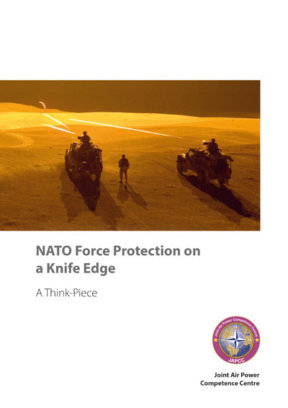Overview
Like previous Force Protection (FP) pieces published by the JAPCC, this work is designed to be a ‘Think-Piece’. Its purpose is to provoke debate with the deliberate intention of engaging and challenging colleagues in that debate. In turn, any discussion will aid in establishing whether the thesis offered is true, false or indeed somewhere in-between?
The title of this paper, ‘NATO Force Protection on a Knife Edge’, was chosen because it is suggested that as we write, FP (and indeed one could argue other vital Air and Space Power Enablers) is in a perilous state and two potentially very different future possibilities exist. Either we accept the arguments put forward here and take steps to address the challenges facing FP or, we dismiss some or all of the arguments offered, continue as now and subsequently risk the consequences.
The thesis offered is simple: We have neglected and under-resourced FP for many years for a variety of reasons, both deliberate and unintentional, that are explained within the paper. The impact of this, it is suggested, is that an intelligent and capable adversary or indeed, one that just gets lucky, could have a devastating effect on military capability. Furthermore, this effect could be one that severely damages the Alliance’s physical ability, or even its resolve, to respond!
The statement above is both bold and some would say controversial. However, the JAPCC’s Vision to ‘Be NATO’s catalyst for the improvement and transformation of Joint Air and Space Power; delivering effective solutions through independent thought and analysis.’ means that it is sometimes necessary to trade on that ‘independence’ by saying what we believe needs to be said, not necessarily what others want to hear. This of course comes with the understanding that what is said must be provable with examples, through the experiences of authors or with the use of irrefutable logic. This paper uses all three mechanisms while remaining sufficiently generic to be both releasable and readable without causing offence to individuals or organizations.
The challenges the paper highlights have not been caused through any malicious intent or incompetent oversight, they are simply the result of the events discussed and exacerbated by the competitive nature of the world as we find it today. The structure of this paper is such that the reader is taken through the arguments offered in a step-by-step fashion so that one is led to the conclusions provided. Should a reader choose to dismiss some or all of the arguments as they are made, then the conclusion(s) reached will likely be different. The reader will therefore reach the end of this paper having decided for themselves whether the thesis offered is proven, somewhat proven or indeed disproven. By default, the readers will then be in a position to decide what action is needed (if any) to remedy the situation.
The genesis of this paper lies within the multiple FP projects that the JAPCC has either delivered or is currently working on. These include doctrine development, enhanced training, a FP decision support tool and work to support FP capability development within nations and organizations. The need for this activity having been the localized identification of some if not all of the challenges identified within this paper. The reach of this activity is such that it can be no coincidence that the same challenges are being encountered in many different locations and with increasing frequency. Therefore, this paper is an attempt to define the challenge, define the cause, suggest the impact and to some degree offer potential solutions.
While this paper is designed as a stand-alone document, it will be used to underpin and/or justify the JAPCC’s FP work going forward. The purpose of this work will be, as it is now, for the JAPCC to assist in the development of an effective and resource-efficient FP capability for the Alliance.
Finally, having acknowledged that some will find elements of this paper controversial and others will recognize some or all of the challenges discussed, it would be remiss of me not to offer all readers the opportunity to respond. Any comments on this paper and its contents will be extremely welcome irrespective of whether they are supportive or dismissive of the thesis. Your constructive comments will assist in the shaping of the JAPCC’s future work to the benefit of the Alliance. Thank you for investing your time to read and consider this study.











